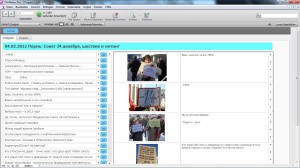(Prrotestrussia.net has a list of data sets and other resources on protest in Russia, but is temporarily out of service as of February 2021 for teachnical reasons.)
PEPS stands for Protest Events, Photos, and Slogans, and is the name of a novel kind of protest event database. It includes data about the Russian protest wave of 2011-13, which centered on the topic of electoral fraud. As of November 2016, it contains data on 967 protest events from 237 locations, most of them between November 2011 and January 2013, but also including a few election-themed protests from earlier in 2011 and in the period from 2013 to 2016.
The database has several important features that set it apart from existing protest event data sets, such as the German PRODAT:
- Rather than solely using media reports, PEPS makes heavy use of eyewitness/participant reports such as blogs and online photo galleries. This allows us not only to counterbalance media bias of various sorts (a general problem in reporting on protest events, and one that is especially serious given the political role of the media in nondemocratic states such as Russia), but also to account for diversity among protest participants, thus going beyond protest organizers’ and prominent spokespeople’s representations of the meaning of protest events.
- PEPS lists every single documented slogan (in particular those displayed on protest signs); in fact the database originally started out as a collection of slogans. This allows us to study the demands and forms of expression of individual protesters at a level of detail unparalleled in quantitative protest event analysis. The inclusion of protest slogans enables us not only to trace the movement’s evolution over time but also to study regional variation and the prevalence of particular topics or types of expression. As of November 2016, PEPS includes 5,380 different slogans.
- PEPS includes copies of the photographs used as well as local copies of other types of electronic sources (such as news items, blog posts etc), which is especially important given the volatility of Internet sources. This also allows users of the database to consult sources and go beyond codeable variables. Thus the database serves not merely as a basis for data sets that can be used in quantitative analysis, but also as a valuable repository of first-hand reports on individual protest events.
PEPS is now hosted by DiscussData, an open platform for archiving, sharing and discussing research data. DiscussData is funded by the German Research Foundation and operated by the Research Centre for East European Studies at the University of Bremen (FSO) and the Göttingen State and University Library (SUB). See here for a brief summary, and here for a longer working paper describing the data set.
